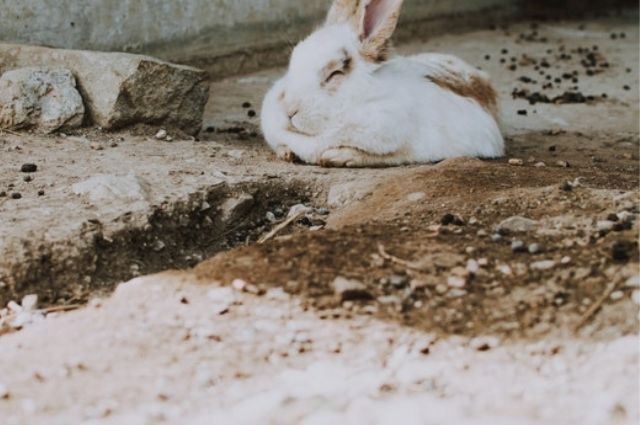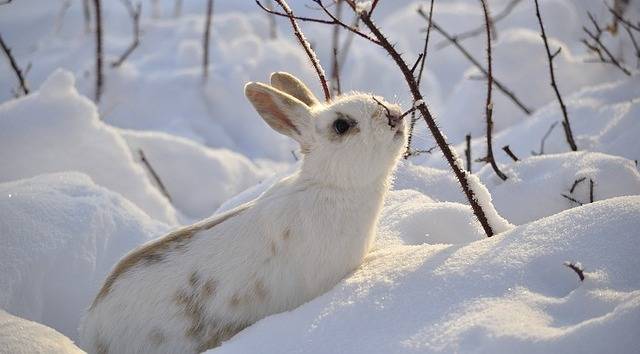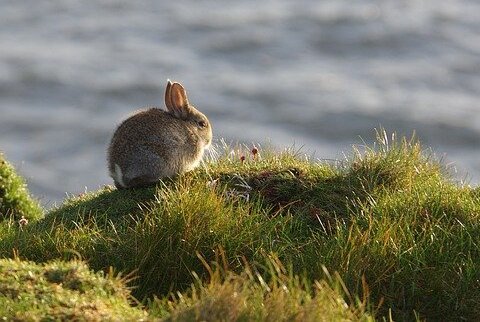When the temperatures drop and the first snowflakes start to fall, have you ever wondered what happens to wild rabbits? Do they hibernate through the winter like some other animals? While rabbits don’t truly hibernate, their behaviors and habits do change when cold weather arrives.
To survive the harsh conditions, rabbits will spend more time underground in burrows and become less active compared to the spring and summer months. Their goals are to conserve energy, stay warm, and avoid hungry predators. In this article, we will walk you through the entire process of surviving the cold winter for wild rabbits. Stay Tuned!
Do Rabbits Hibernate?
No, rabbits do not truly hibernate. They do not have the physiological abilities to enter a state of deep dormancy and reduced body temperature like bears, rodents, and other hibernating species. However, rabbits do exhibit some behavioral changes in the winter that help them conserve energy when food is scarce. Rabbits are less active in the winter months and spend more time hiding in burrows underground.
This avoids exposure to the cold and helps them preserve energy. Their metabolism does slow down compared to summer but not nearly to the extent of true hibernators. While they are awake and alert all winter, their activity is reduced to lower their energy needs. So while rabbits do not hibernate, their behaviors adapt in winter to conserve energy similarly.
What Is Hibernation?
Hibernation is a complex process for animals to conserve their energy during adverse weather conditions. Hibernation is when an animal goes into a deep sleep state during the winter months to conserve energy when food is scarce. Their body temperature drops dramatically and their heartbeat and breathing slow down. True hibernation involves complex physiological changes that rabbits are not capable of.
Rabbits cannot store enough body fat or reduce their metabolism to the extremely low levels required for true hibernation. While rabbits exhibit some behavioral changes in winter, they do not enter a state of deep dormancy and reduced physiological function like hibernating animals do. Rabbits remain moderately active over the winter and do not experience the extreme metabolic changes of true hibernators.

Do Rabbits Migrate?
No, rabbits generally do not migrate over long distances. Unlike some species like birds which migrate hundreds or thousands of miles to warmer climates, rabbits remain in the same general area year-round. However, they may shift their home territory slightly within their habitat to find spots that provide better shelter and protection from severe winter conditions.
In very cold regions, rabbits may move into more forested areas in winter for better cover and access to food sources like bark and twigs. But overall, they do not make major migrations, and their range is largely consistent across seasons. Rabbits are well adapted to deal with winter right where they are, using strategies like huddling in burrows and being less active. Their suitable habitat tends to remain adequate all year.
So, Which Animals Hibernate in winter?
Now you might be interested to know the hibernating animals. Well, there are a lot of species that are hibernating in the winter. Bears, Chipmunks, Box Turtles, hedgehogs, and land snails are the perfect example.
These animals are inactive during the winter. When the temperature falls, their metabolism rate becomes low and they hibernate in a safe place. Rabbits are different from them indeed.
Where Do Rabbits Shelter or Go in Cold Months?
During the winter, rabbits seek out sheltered spots to help them endure the harsh conditions:
- Burrows – Rabbits spend more time underground in burrow systems with multiple entrances and chambers. The burrows provide insulation from cold and wind. Rabbits huddle together in chambers to share body heat.
- Brush piles – Brush piles, fallen logs, and dense shrubs provide shelter from wet snow, wind, and cold. Rabbits hide under and within these structures.
- Thickets – Dense thickets formed by shrubs, young trees, and tall grasses are attractive winter spots. They provide cover from predators and cold.
- Dens – Rabbits may occupy abandoned dens dug by foxes or badgers underground. These ready-made burrows offer protection.
- Sheds – In suburban areas, rabbits may take refuge under garden sheds or porches. The enclosed spaces stay drier and less cold.
Seeking out these sheltered spots conserves energy and improves survival rates during harsh winters.

How Do Wild Rabbits Survive in The Winter?
Rabbits are well adapted to survive the harsh conditions of winter using the following key strategies:
- Burrowing – Rabbits spend more time in underground burrows and chambers which provide insulation from cold and wind. Huddling with other rabbits helps maintain body heat.
- Reduced activity – Rabbits conserve energy by being less active in winter. They minimize time spent exposed to above-ground foraging.
- Bark and twig eating – Rabbits gnaw on twigs, bark, and woody vegetation to supplement their diet when other foods are scarce.
- Fur thickening – Molting in fall results in a thicker, dense winter coat to retain body heat.
- Fat storage – In summer and fall, rabbits eat heavily to store fat reserves which provide extra energy through winter.
- Seeking shelters – Rabbits find protected micro-habitats like brush piles, evergreen forests, and manmade structures.
- Enlarged heart and lungs – Adaptations allow for colder weather endurance.
These survival adaptations enable wild rabbits to make it through harsh winters despite challenges like extreme cold, predation, and limited food.

How Cold Can Rabbits Tolerate?
Rabbits can tolerate very cold temperatures thanks to their robust adaptations for winter survival. In the wild, rabbits thrive in environments with average winter temperatures as low as -26°F (-32°C) or colder. However, they do have a lower limit and risk death if temperatures remain below -40°F (-40°C) for too long. Exposure to bitter cold winds can also be dangerous. To survive cold winters, rabbits rely on thick fur coats, high-fat reserves, huddling with other rabbits in burrows, reduced activity levels, and choosing the most insulated shelters.
Do rabbits sleep more in the winter?
Rabbits do not undergo true hibernation or sleep significantly longer in winter. While they reduce activity levels when food is scarce, they remain alert for predators and ready to flee danger. Their body temperature and metabolism stay relatively high. Rabbits may spend more time tucked away in burrows and nests to conserve energy. But they still regularly emerge to eat, drink, and watch for threats. They simply rest curled up in sheltered areas more often. Their sleep cycles do not dramatically change across seasons.
Do rabbits hibernate in summer?
No, rabbits do not hibernate during the summer months. Hibernation involves entering a deep sleep state for extended periods, which rabbits do not do at any time of year. Rabbits remain active and alert year-round so they can detect and flee from predators. In summer, rabbits may be more active at night when temperatures cool down. During hot days they rest in burrows or under bushes but maintain their normal metabolic rate and body temperature. They emerge regularly to forage and do not have prolonged periods of deep sleep.
Do rabbits hibernate in the fall?
No, rabbits do not hibernate in the fall. Hibernation involves entering a deep sleep state, which rabbits do not do. In the fall, rabbits remain active and alert as they prepare for winter. They spend fall months foraging and storing up fat reserves. Rabbits may begin spending more time in burrows and nests as temperatures drop, but they continue to emerge regularly to eat, drink, and watch for predators. Their metabolism and body temperatures remain high. While rabbits reduce activity when food is scarce, they never undergo true hibernation during fall or any other season.
How long do rabbits hibernate in the winter?
Rabbits do not hibernate at all in the winter. While they may be less active when food is scarce, rabbits never enter true hibernation, which involves deep sleep for extended periods. Rabbits remain alert in winter so they can detect and flee from predators. They do not lower their body temperature or have prolonged sleeping states. Rabbits simply conserve energy in winter by resting more in sheltered areas while still emerging regularly to forage and watch for threats.
Final Thoughts
Rabbits do not hibernate in the true sense of the word. While some rabbits may be less active in the winter, they do not go into a deep sleep or lower their body temperature for extended periods like bears or other hibernating animals. Rabbits remain alert and active year-round so they can flee from predators.
They may seek shelter in burrows more often and conserve energy when food is scarce in winter. But their winter slow-down is more accurately called torpor, not a true hibernation. Rabbits rely on their adaptations of fur coats, fat stores, and burrowing to survive the cold seasons without completely shutting down.
Recent Posts
You may have already adopted a bunny or are planning to get one. Rabbits are a great source of pleasure for a family, especially children. They are peaceful and need moderate space for...
Perhaps, you have already adopted a bunny and now looking for an effective suggestion for a rabbit cage setup. Well, setting up a rabbit cage is not a difficult task indeed. If you have the proper...
